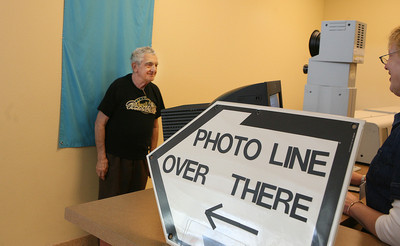ID mandate gets real with driver’s license extension
Real ID equals real mess.
That's what a number of states were warning the federal Department of Homeland Security a few weeks ago as the bureaucratic gurus in Washington, D.C., readied their plan to reinvent government-issued identification.
"It would have been a nightmare," said Tom Jacobs, spokesman for the Nevada Department of Motor Vehicles.
The Real ID Act, passed in May 2005, required all states to begin issuing new licenses with new security features by May 11. The problem was Homeland Security did not actually tell the states what was needed to comply with the law until Jan. 11.
DMVs would have had four months to meet the standards.
Which means you, me and a lot of other people (don't forget there are 2 million of us in Clark County) would have had to go down to our local DMV branch with a birth certificate or passport and Social Security card in order to comply with the law.
Then, we would get in line and wait.
And wait. And wait, just like the refugees in Casablanca.
(I can see it now: They're serving guest seven, and I'm holding ticket 482).
Most of us have had the displeasure of a DMV visit at some point in our lives. And it's not Nevada's DMV that I'm going after here. Every DMV I've ever been to has taken hours upon excruciating, mind-numbing hours of waiting.
Thankfully, Homeland Security allowed the states to apply for an extension. Nevada was granted the extension, which means the Silver State's current driver's licenses and identification cards will be accepted on airplanes and at federal buildings through Dec. 31, 2009.
Basically, anyone born on or after Dec. 1, 1964, have until Dec. 1, 2014, to get a new license or ID card. Those born before Dec. 1, 1964 have until Dec. 1, 2017, to do the same.
Congress passed the Real ID Act giving Homeland Security the power to set identification standards for state driver's licenses if those licenses were to be used to board an airplane or enter a federal courthouse.
The idea was to make sure everyone had and was legally using an ID that could be checked against a national database. Right now, states don't have access to each other's drivers license or identification card lists, unless you have a trucker's license.
By making everyone go back and redo their identification, the feds were hoping to root out terrorists, identity thieves and others who might be abusing the system.
At least one of the terrorists who carried out the Sept. 11, 2001, terrorist attacks had four driver's licenses and ID cards from three states.
The Real ID act set a couple of minimum national standards for identification cards, including that certain information and security features be included on each card and proof of identity and U.S. citizenship or legal status is needed from each applicant.
One change is for applicants to have their driver's license photograph shot at the beginning of the application process, so a picture would exist of anyone who failed to prove their identity. The picture then would be saved and used so the person could not later con the system.
Some fears were alleviated, at least among the conspiracy theorists, because the cards are not going to contain microchips.
In Nevada, the DMV is planning on switching to a more secure system by September.
The new driver's license and ID cards will have 15 security features, including precision printing and ghost images, according to the DMV's Web site.
Another important change is that motorists will no longer get their license while at the DMV. Instead, drivers will be given temporary permits and the license will be sent later in the mail.
The idea is that all the licenses will be produced at a secure, centralized facility.
Over the next year, Homeland Security expects all states to begin checking both the Social Security numbers and immigration status of license applicants.
Jacobs said while Nevada doesn't have a law that checks for legal residency, you still must present enough identification that would establish it.
DMV officials are still trying to work out what would be required to establish residency, but it might include mortgage statements, tax assessor's notices and utility bills.
The question that I'm sure is on most minds is: When do I have to go get my Real ID?
Thanks to the extension, chances are you will be able to wait until your driver's license renewal date before you make the dreaded trip to the DMV.
If you have a question, tip or tirade, call the Road Warrior at 387-2904, or e-mail him at roadwarrior@reviewjournal.com or fmccabe@reviewjournal.com. Please include your phone number.
The Rampart Boulevard onramps and offramps for Summerlin Parkway will be closed today and Feb. 16 and 17, the Las Vegas Public Works Department announced. Motorists should also watch for temporary lane restrictions on Summerlin Parkway, which will be reduced to one lane in both directions, from Rampart to Town Center. The traffic disruptions are so crews can reconstruct the pavement approaches to the concrete bridge decks and perform concrete deck repairs. Work will take place from 5 a.m. to 4 p.m.
Motorists should watch for traffic disruptions at the intersection of Tenaya Way and Azure Drive through the next three weeks, the Las Vegas Public Works Department announced. Nevada Power crews will be doing utility work at the intersection from 9 a.m. to 5 p.m.
Road construction on Lamb Boulevard, between Charleston Boulevard and Owens Avenue, will continue until Feb. 22, according to the Las Vegas Public Works Department.
REVIEW-JOURNAL





















